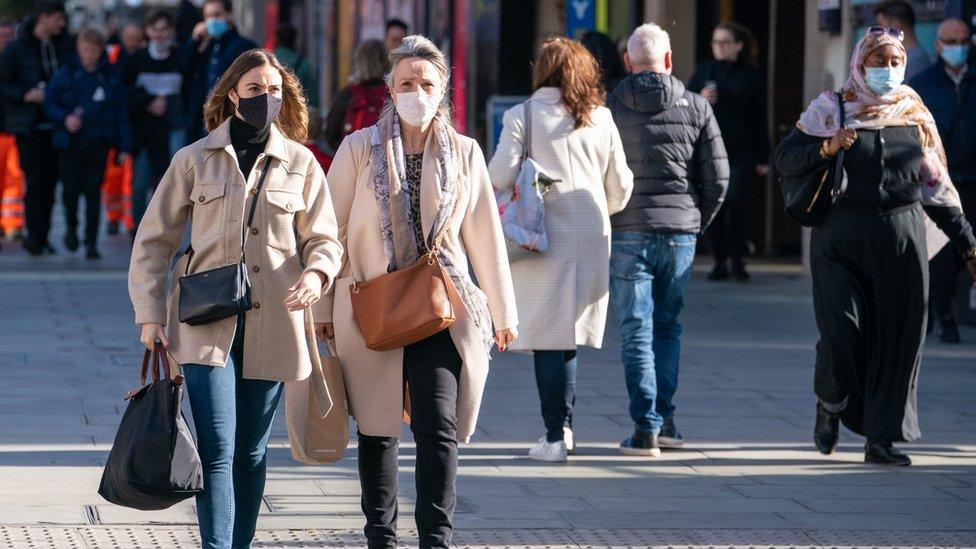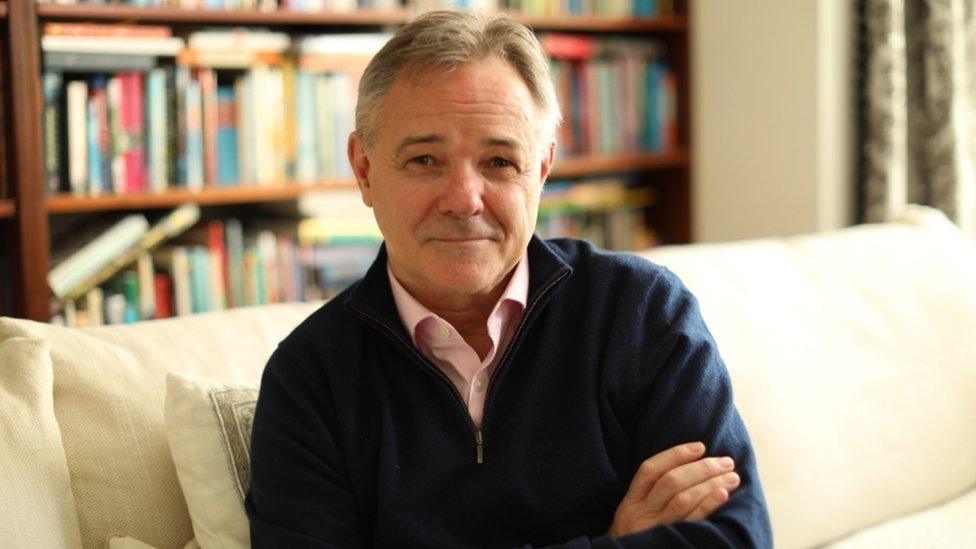Covid: Hard months to come in pandemic for UK, says Van-Tam
- Published
- comments
Prof Van-Tam: "There are some hard months to come in the winter"
"Very high" coronavirus rates in the UK at present mean there are hard months to come, England's deputy chief medical officer has warned.
Prof Jonathan Van-Tam told the BBC it was a concern that Covid levels were "running this hot, this early in the autumn season".
He said too many people believed the pandemic was now over.
Christmas and the winter months are "potentially going to be problematic", Prof Van-Tam warned.
The UK recorded 33,865 Covid cases on Tuesday and 293 deaths within 28 days of a positive test.
In a question and answer session with BBC Breakfast and BBC Radio 5 Live, Prof Van-Tam said that while cases appeared to have stabilised, they were very high, and above most of Europe.
He also said deaths were rising and there were signs infections were starting to "penetrate" older age groups.
The current levels of coronavirus meant caution was now needed, he said, adding that experts would be continuing to analyse the data over the next days and weeks.
How Christmas is affected would depend on a "whole range of behaviours", he said.
Face coverings and the caution people took in interacting with others, along with the speed of vaccinations, would be "a big determinant between what happens now and the darkest months of the winter".
Using a football analogy, as he has often done while commenting on the pandemic, he said: "I would say we're kind of half-time in extra time, and I think the final whistle in terms of - I can't predict it - but my personal view is that we've got a few more months to run, and I think we'll be in a much calmer set of waters by spring."


Analysis
BBC health reporter Philippa Roxby
Jonathan Van Tam warned this morning that people should not assume the pandemic was over, or let their guard down.
He urged caution, particularly when meeting other people, and the wearing of face coverings in appropriate places.
He added that vaccinating young children from the age of five is not a priority in the UK - unlike in the US. He believes boosters and first doses for the five million unvaccinated are much more important.
But it's not just Covid he's worried about.
Flu and other winter respiratory viruses are returning this season after a complete absence last year when no one was mixing - and anything we can do to protect against Covid will protect against these viruses too.

Prof Van-Tam urged people to get their Covid jabs, boosters and flu vaccines, adding that it was "very important" this winter.
Experts have warned that people are at increased risk of death and serious illness if they are co-infected with Covid and flu.
More than 40 million people in the UK are being offered a flu jab this year.
For the first time this includes all secondary school children up to the age of 16.
A booster jab programme for the over-50s and younger adults with health conditions is currently being rolled out, but he urged the NHS and the government to make it clearer to people when their turn may be coming up.
Asked whether people will need a booster every six months, Prof Van-Tam said it was likely it would provide protection for longer than the first two doses, but this was not yet fully known.
Prof Van-Tam's comments come after a member of a group of scientists advising the government on coronavirus announced he had stepped down from the role.
Sir Jeremy Farrar, who had been part of the Scientific Advisory Group for Emergencies (Sage) since the start of the pandemic, said he was stepping down to focus on his work at the Wellcome Trust - a medical research centre - but warned the high level of infections in the UK remained concerning.
Amid speculation that Sir Jeremy was unhappy with the way ministers handle scientific advice, Prof Van-Tam said he did not read any more into his resignation other than he wants to concentrate on other work.
He added: "It's a tribute to Sir Jeremy and so many other scientists that they have supported us so hard and for so long and given such invaluable, independent advice."
'Crux point'
Meanwhile, a member of the Joint Committee on Vaccination and Immunisation, which provides advice to the government, said that while the infection rate is "high", he does not believe the current case numbers of coronavirus are "out of control".
Prof Jeremy Brown told BBC Radio 4's Today programme the country was at a "relatively important crux point".
If infection rates and hospitalisations went down it would be "very encouraging", but if they started going up it would be "a different situation completely".
Related topics
- Published5 July 2023

- Published3 November 2021
